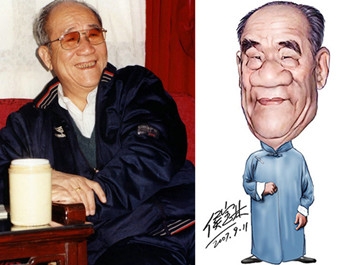
我可能是天津人
I Might Have Come from Tianjin
侯寶林
Hou Baolin
還是從火車上說起吧!大約在我四歲多的時(shí)候,我坐過火車。當(dāng)時(shí)帶我坐車的人,是我的舅舅,叫張全斌。我記得那時(shí)我的打扮挺滑稽的,穿著藍(lán)布大褂、小坎肩,戴瓜皮小帽。那時(shí)候,小孩子打扮成那個(gè)樣子,夠不錯(cuò)了。在我的童年中,也就只:有過這么一次。在火車上,因?yàn)樾。瑳]坐過火車,也很少見過家里以外的人,覺得挺新鮮。也許人在幼年時(shí)代終歸想要些溫暖吧!那時(shí)舅舅抱著我,哄著我,我覺得很溫暖。一路上吃了半斤炒栗子,睡了一會(huì)兒覺,就到了北京。根據(jù)這個(gè)情況,現(xiàn)在估計(jì)起來,我可能是從天津來的。我現(xiàn)在對我原來的父母還有個(gè)模糊不清的印象,父親、母親的形象還能回憶起一點(diǎn)兒,但很模糊。究竟家里姓什么?哪里人?不知道。我只知道自己的生日和乳名。生日是自己長大以后聽家里大人說的,是農(nóng)歷十月十五酉時(shí)生人。所以我的乳名叫“酉”,北京人愛用兒化韻,前面加個(gè)小,后面加“兒”,就叫“小酉兒”。關(guān)于我個(gè)人的歷史情況,我就知道這一些,再多一點(diǎn)都記不起來了。
Let me begin with my trip on the train. When I was about four years old I had traveled by train. The man I traveled with was my uncle Zhang Quanbin. I still remember how funny I looked the way I was dressed - in a blue cloth gown with a short sleeveless jacket over it and a skull cap on the head. In those days it was good enough for small kids to be dressed like that. However, it was my only experience to boast about in my childhood. As I had never traveled by train or met anyone outside my family before, I felt everything on the train was new to me. Probably in childhood, one always needs some comfort. Sitting in my uncle's lap, being humored all the way, I was very happy. We ate half a jin of roast chestnuts, had a nap and soon arrived in Beijing. With the hints mentioned above I assume I might have come from Tianjin. Even today I can recollect what my own parents looked like but, of course, my impression is blurry. As for what my family name was and where my parents came from, I really don't know. I only remember my birthday and my infant name. I was told about my birthday by my foster-parents when I grew up. I was born in the “you" period (between 5-7 p.m.), 15th of the 10th lunar month. So I was named You. Prefixed with xiao-young, and suffixed with a diminutive er--an intimate way of addressing young and small things by Beijingers, my name, therefore, became Xiao You'r. This is all I know about my childhood and beyond that I do not remember much else.
更多翻譯學(xué)習(xí)資源,敬請關(guān)注可可英語。











